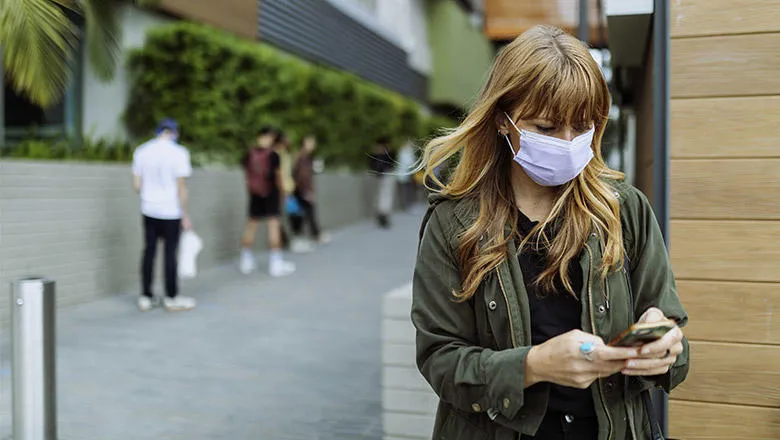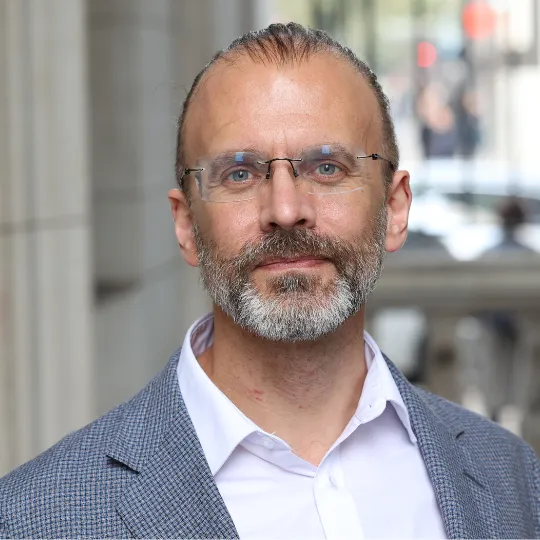18 June 2020
Social media use linked to belief in Covid-19 conspiracies and breaking lockdown rules
There is a toxic mix between underlying beliefs, misleading information and how people act

People who get their information about coronavirus from social media platforms such as Facebook and YouTube are more likely to believe conspiracy theories about Covid-19 and to have broken key lockdown rules, according to a new UK study by King’s College London and Ipsos MORI.
The findings are based on three separate surveys, and have been published in a peer-reviewed article by King’s College London academics in the leading journal Psychological Medicine.
The study was supported by the NIHR Health Protection Research Unit in Emergency Preparedness and Response at King's.
The figures below and in the new study relate to the most comprehensive of the three surveys, which involved 2,254 interviews with UK residents aged 16-75, carried out online between 20 and 22 May 2020.
View the full report for charts and detailed analysis >
The researchers tested seven statements about coronavirus, revealing the following levels of belief:
Covid conspiracies and confusions
- Three in 10 (30%) think coronavirus was probably created in a lab, up from a quarter (25%) at the beginning of April.
- Three in 10 (28%) think most people in the UK have already had coronavirus without realising it.
- Three in 10 (30%) believe the Covid-19 death toll is being deliberately reduced or hidden by the authorities.
- One in seven (14%) believe the death toll is being deliberately exaggerated by the authorities.
- One in eight (13%) believe that the current pandemic is part of a global effort to force everyone to be vaccinated.
- More than one in 20 (8%) believe that the symptoms that most people blame on Covid-19 appear to be connected to 5G network radiation.
- More than one in 20 (7%) believe there is no hard evidence that Covid-19 really exists.
The link with social media
Several of these statements are conspiracy theories which suggest coronavirus may not be a threat to public health. The peer-reviewed article finds a statistically significant link between believing in such conspiracy theories and using social media.
In particular, people who believe in these conspiracy theories are more likely to get a fair amount or great deal of their information about the virus from Facebook and YouTube:
- 60% of those who believe the virus is linked to 5G radiation get their information from YouTube, compared with 14% of those who think that’s false.
- 56% of people who believe there’s no hard evidence Covid-19 exists use Facebook as a key information source, almost three times higher than the proportion of non-believers who do (20%).
- 45% of those who believe Covid-19 deaths are being exaggerated get a lot of their information from Facebook, more than twice the 19% of non-believers who say the same.
The article also finds that people who have broken the lockdown rules are more likely to be getting their information on the virus from social media. In the latest and most comprehensive survey:
- 58% of those who have gone outside with Covid-19 symptoms use YouTube as a main information source, compared with 16% of those who haven’t.
- 18% of those who have obeyed the 2-metre rule get a lot of their information from the video streaming site, in contrast to 42% among those who haven’t obeyed it.
- 37% of people who have had friends or family visit them at home list Facebook as a key source, compared with 23% of those who haven’t.
Compliance with the lockdown
The article finds a statistically significant link between believing in such conspiracy theories and breaking lockdown rules, which can be seen in the latest survey’s findings:
“The number of people reported as dying from coronavirus is being deliberately exaggerated by the authorities.”
- Three in 10 (28%) of those who believe this have had friends or family visit them at home – more than twice as many as the 12% of non-believers who have done the same.
- One in five (18%) believers have gone to work or outside with suspected coronavirus symptoms, almost four times more than the 5% of non-believers who have done so.
- 82% of believers have followed the 2-metre social distancing rule, compared with 95% among those who don’t believe this conspiracy.
“The symptoms that most people blame on coronavirus appear to be linked to 5G network radiation.”
- Three in 10 (29%) people who believe this have gone out despite suspecting they may have coronavirus, compared with just 4% among those who reject this belief.
- A third (33%) of believers have had friends or family to visit them at home, which falls to one in eight (13%) among non-believers.
- 83% of those who believe this conspiracy have followed the 2-metre rule, compared with 95% among those who do not believe it.
“There is no hard evidence that coronavirus really exists.”
- Four in 10 (38%) believers have had others visit them, compared with just over one in 10 (12%) non-believers.
- 35% of believers have also gone out when they should have been self-quarantining, almost nine times higher than the 4% of non-believers who have done the same.
- 72% of those who believe this conspiracy have complied with the 2-metre rule, 23 percentage points lower than the proportion of those who do not believe it (95%).
The link with political views, age and education
- 39% of Conservative voters think coronavirus was probably created in a lab, compared with 23% of Labour voters. And belief among Tory voters has risen by 14 points since early April.
- Leave voters (43%) are twice as likely as Remain voters (20%) to believe the virus was created in a lab.
- Labour voters (38%) are twice as likely as Conservative voters (19%) to believe the coronavirus death toll is being deliberately reduced or hidden by the authorities.
- 19% of those aged 16-44 believe the death toll is being exaggerated, compared with 8% of those aged 45 and over.
- Belief that Covid-19 deaths are being exaggerated declines with education level: 25% of those with no formal qualifications believe this, which falls to 10% among those with a degree or higher.
- 22% of 16-24-year-olds believe 5G is linked to Covid-19 – the highest of any age group. By comparison, 3% of those aged 45-54 and 2% of those aged 55-75 believe this.
Dr Daniel Allington, Senior Lecturer in Social and Cultural Artificial Intelligence, Department of Digital Humanities at King’s College London, said:
“Our findings suggest that social media use is linked both to false beliefs about Covid-19 and to failure to follow the clear-cut rules of the lockdown. This is not surprising, given that so much of the information on social media is misleading or downright wrong. Now that some of the lockdown rules are being relaxed, people will have to make more and more of their own decisions about what is safe or unsafe – which means that access to good-quality information about Covid-19 will be more important than ever. It’s time for us to think about what action we can take to address this very real problem.”
Professor Bobby Duffy, Director of the Policy Institute at King’s College London, said:
“Even the more extreme conspiracy theories around Covid-19 are thought to be true by a large section of the public – with one in five people saying they believe at least one from there being a link to 5G radiation, or that the pandemic is part of a global forced vaccination programme, or that there is no evidence the disease actually exists.
“And this is important, as there are clear links between belief in conspiracies and both lower trust in government and less compliance with the guidelines set to control the disease. Where people get their information about the virus is also strongly related, with both believing in conspiracies and breaking the lockdown rules clearly linked to getting more of your information from social media.
“These sort of associations cannot prove that misinformation on social media platforms causes belief in conspiracies, lower trust and a greater likelihood of breaking the rules, but they point to a toxic mix between underlying beliefs and misleading information that can have real effects on how people behave, even during a pandemic.”
View the full report for charts and detailed analysis >
Technical details
Ipsos MORI interviewed a sample of 2,254 adults aged 16-75 in the UK using its online i:omnibus between 20 and 22 May 2020. Data has been weighted to the known offline population proportions for age within gender, government office region, working status, social grade and education. All surveys are subject to a range of potential sources of error.
Some behaviours and beliefs are relatively rare among the population, and therefore have small bases. However, each has a base size of around 140, and the relationships are shown to be highly statistically significant in statistical tests.
For demographic controls and tests of statistical significance, see “Health-protective behaviour, social media usage, and conspiracy belief during the COVID-19 public health emergency” by Daniel Allington, Bobby Duffy, Simon Wessely, Nayana Dhavan, and James Rubin, in the journal Psychological Medicine.

